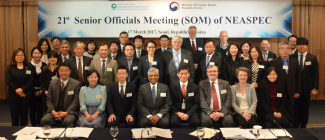NEASPEC 21st Senior Officials Meeting

The 21st Senior Officials Meeting was organized by ESCAP East and North-East Asia Office serving as the NEASPEC Secretariat and hosted by the Ministry of Foreign Affairs of Republic of Korea. The Meeting commended the progress in implementing activities in five programme areas while noting the importance of building synergies with relevant national, subregional, regional institutions and organizations, and multilateral programmes. The Meeting underlined the linkages of NEASPEC with global goals including the Sustainable Development Goals (SDGs) and the Paris Climate Agreement. The Meeting also emphasized the significance of results-oriented projects; knowledge and experiences sharing; and the need for further strengthening cooperation among member States on subregional environmental challenges.
With regard to NEASPEC five programmes, the Meeting came to the following decisions:
- Transboundary Air Pollution: The Meeting discussed the proposal of launching a new subregional framework, North-East Asia Clean Air Partnership (NEACAP), and decided to have further consultations on proposed work and arrangements for its further development.
- Nature Conservation: Follow-up to the two projects, “Study on Transborder Movement of Amur Tigers and Leopards using Camera Trapping and Molecular Genetic Analysis”, and “Conservation and Rehabilitation of Habitats for Key Migratory Birds in North-East Asia”, the Meeting approved new activities under the concept of Connectivity Conservation that include (a) joint assessment of corridors and habitats in transborder areas; (b) unified monitoring methodology; (c) joint disease monitoring for Amur tiger and leopard; (d) Agro-biodiversity management study and management guidelines for key habitats of cranes, (e) information sharing and (f) young scientists and international nature school for migratory birds. The Meeting also supported the planned joint study of NEASPEC and Korea Environment Institute on the environmental and institutional context of connectivity conservation in transboundary habitats, focusing on the Dauria International Protected Areas (DIPA) and Tumen River area.
- Marine Protected Areas: The Meeting approved a new project of “Strengthening the subregional cooperation through knowledge sharing on sustainable management of MPAs”. The project will analyse and improve management practices in member sites of North-East Asia Marine Protected Area Network (NEAMPAN) and support knowledge sharing among the sites.
- Low Carbon Cities: The Meeting approved the peer review and comparative study under the North-East Asia Low Carbon City Platform (NEA-LCCP) which will be studies at two levels: peer review at municipal level to support improving low carbon city plans and programmes in selected cities, and comparative study at national level to review government policies.
- Desertification and Land Degradation (DLD): The Meeting approved the “Study on North-East Asia Land Degradation Neutrality and Sustainable Development”. Land Degradation Neutrality has been recognized as a key approach to combatting DLD and incorporated as a target of Sustainable Development Goals (15.3). The study will review LDN at the subregional- and national-level as well as in the context of sustainable development.
- Opening Remarks by Mr. Kilaparti Ramakrishna, Director, UNESCAP East and North-East Asia Offic
- Welcoming Remarks by the host government
Statements by delegations of the member States.
[Presentation] SDGs and the Role of Environment Statistics: Outcome of the Subregional Workshop on Environmental Statistics, ESCAP Statistics Division
a) Transboundary Air Pollution
b) Nature Conservation in Transboundary Areas
c) Marine Protected Areas
d) Low Carbon Cities
e) Desertification and Land Degradation
Short presentations to be made by the Secretariat and partner institutions for each programme area, followed by interventions from delegations of member States.
Member States, the Secretariat and UN and international organizations present proposals for new activities to be conducted under NEASPEC. Each proposal will be introduced with a presentation followed by discussions.
The session will review the state of the core/project funds and discuss budget plan.
 Back to Meetings
Back to Meetings